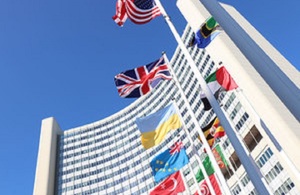UK statement on space and climate change at the UN Committee on the Peaceful Uses of Outer Space (COPUOS)
Delivered by a member of the UK Delegation to the UN Committee on the Peaceful Uses of Outer Space (COPUOS 65) in June 2022.

UK Mission Vienna
Chair,
The UK was proud to assume the Presidency of the 26th UN Climate Change Conference of the Parties (COP26), in partnership with Italy, last year.
More than one hundred countries signed up to the Global Methane Pledge where countries agreed to collectively slash methane emissions by 30 percent by 2030. This outcome means the goal of preventing global temperatures from rising more than 1.5 degrees is still alive.
Science has repeatedly told us that the impacts of letting temperatures rise beyond 1.5C will be devastating. This is why COP26 was so crucial, the world acknowledged that the cost of inaction far outweighs the cost of action.
There was also a landmark pledge by over 100 leaders to end deforestation by 2030 and space has a key role to play here. The UK led on a session highlighting how we can use satellites to measure the storage of carbon in the world’s forests. Furthermore, the UK is proud to be a part of the ESA Biomass project which aims to provide the first comprehensive measurements of global forest biomass. The UK believes it is critical that climate data from space agencies is shared to address this issue and we must work collectively to resolve it.
The UK also showed a demonstration of the Climate Risk Index Tool which delivers risk assessments based on satellite and climate data to help the insurance sector provide vital financial products to those at risk from droughts and wildfires.
At COP26, the UK partnered with Space4Climate and the Global Partnership for Sustainable Development Data to host the ‘In Space We Trust’ event which gave a platform to speakers from indigenous groups and countries across the globe such as Vietnam, Colombia, and Cabo Verde. It showcased existing partnerships using space for climate action and climate data capacity building, in collaboration with developing economies.
Chair,
As part of our advocacy for global co-operation, the UK is working in partnership with UNOOSA to address the information gap for space related climate actions.
Following its announcement at COP26 in 2021, UNOOSA is currently finalising the report of a UKSA funded Strategic Mapping Exercise related to existing international efforts, using space technologies to support climate adaptation, mitigation, monitoring, and resilience.
The aim of this exercise is to develop a strategic view of which organisations are actively coordinating space and climate activities and, through this, increase coherence across the multilateral system and relevant international organisations such as Committee on Earth Observation Satellites (CEOS), Earth Observing System (EOS), Group on Earth Observation (GEO) and the World Meteorological Organization (WMO).
Additionally, the UK is looking forward to the UN-Austria Symposium in September this year where parties will share experiences and best practices to adapting to climate change.
The UK were delighted to lead sessions at the World Space Forum and gave a speech on empowering climate action with space technology, data, and people. We emphasised the importance of space assets as a unique and invaluable tool to monitor climate change. We also promoted the idea of space data management in a format which is suitable for global models and national action.
Chair,
The UK has highlighted Earth observation data as a priority to tackle climate change challenges. The valuable information from Earth observation satellites helps people understand the global, regional, and local changes, to adapt to, and mitigate, the devastating effects of climate change around the world. It will help inform the decision making from planners needing climate risk data such as heat waves to emergency response to floods.
The UK are proud to collaborate with ESA on the Copernicus and TRUTHS missions to further the field of Earth Observation. This is a UK-led satellite climate mission to provide radiometric measurement of the Sun and Earth with unprecedented accuracy to contribute to climate modelling. TRUTHS will create a space-based climate observatory and not only make measurements itself, but also improve the performance of other Earth observation missions through cross-calibration and will enable the 10-fold improvement in accuracy of data.
Furthermore, the UK is proud to be part of the build, calibration, and science of the MicroCarb mission with France which was announced at Paris COP25 and we will continue to keep the Committee informed of its progress going forward.
Chair,
The UK has funded an innovative project by the National Centre for Earth Observation and Ordnance Survey which will use satellite data to monitor and map heat in locations at the greatest risk from climate change. The UK hopes this will provide meaningful insights for policy makers to manage the impacts of climate change in hot spots in the UK and globally.
The UK is looking to become a signatory of the Charter for the establishment of the Space for Climate Observatory. The UK already has a national coordination of government, industry and academia developing trusted climate services – the Space4Climate network, so it is logical to help coordination at the international level.
The UK believes it is imperative that we work across borders to forge trusted partnerships, learn lessons from each other, and maximise utilisation of technology and data to drive climate action.
Finally Chair,
The United Kingdom is looking forward to taking part in the ambitious COP27 in Egypt later this year and looks forward to making further progress on climate change action.
Thank you for your kind attention.